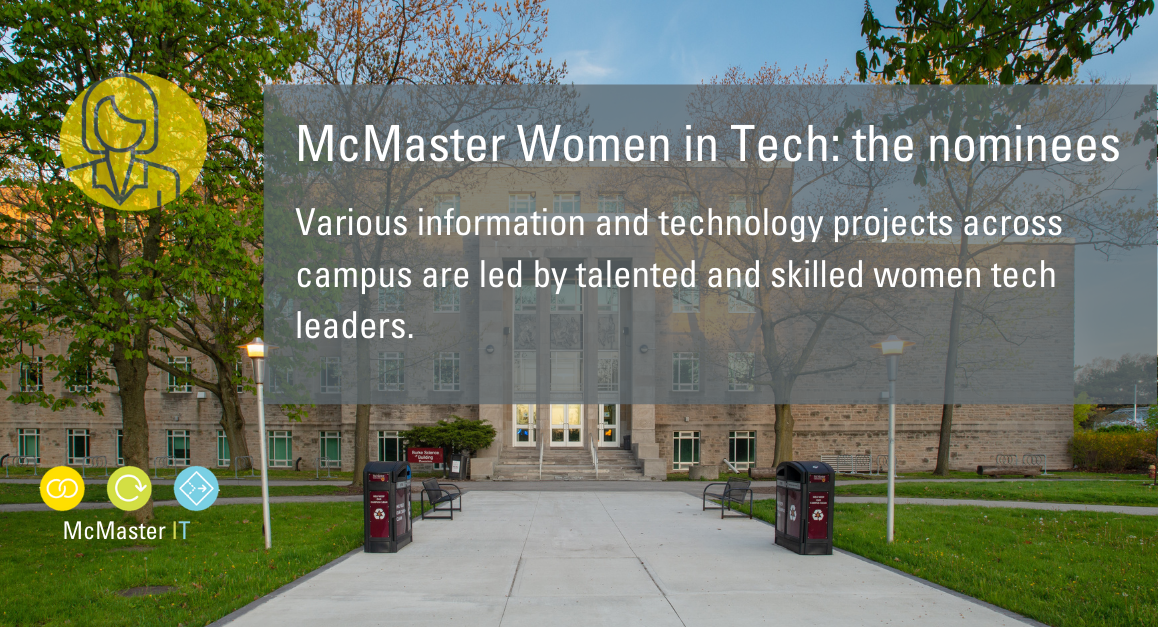McMaster Women in Tech: the nominees

One year ago, the Office of the AVP & CTO in partnership with the Equity and Inclusion Office launched the ‘McMaster Women in Tech’ — an initiative to raise the platform of women tech changemakers within and connected to McMaster.
“We’ve brought lots of women into this initiative to celebrate their amazing accomplishments as Changemakers. And they have all had very different roles and experiences,” says Gayleen Gray, McMaster’s associate vice-president and chief technology officer.
From faculty members, students, staff and leadership, our selected Changemakers have been using tech in innovative ways across diverse areas, including start-ups, education, IT security, equity and research. A principle at the core of all Changemakers is delightful technologies — technology not just for its own sake but what it can do to help us, enable us and enhance our lives.
Now, as McMaster Women in Tech series concludes, the Office of the AVP & CTO wishes to honour and acknowledge all nominees. Colleagues from across campus nominated many women tech leaders highlighting the depth and breadth of talent at the organization.
Technology for positive change is key. And identifying where processes can be improved is sometimes half the battle. Jessica Blackwood is the Faculty of Science’s first accessible digital media specialist, a role that brings accessibility thinking top of mind for digital content and learning material. Her work better positioned the university’s shift to remote work when 2020 arrived by uncovering key accessibility features of our virtual and remote tools, all with a focus on audience experience and what subject-matter experts needed to work efficiently and effectively.
Change can also happen when you discover new ways to use old tools. Ginet Segui Lines is a senior research computing specialist in Research and High-Performance Computing Support (RHPCS). Through her development of LimeSurvey, Ginet has changed how researchers and staff conduct online surveys at McMaster, enabling researchers to quickly focus on the deployment of their research and ensuring protections for research participants of survey-based studies. Ginet closely worked with the McMaster Research Ethics Board (MREB) to streamline processes by providing researchers with LimeSurvey templates with complex logic trees.
Technical knowledge also needs a clear vision to implement. Zuzana Romano, a business analyst for the Computer Services Unit, plays a pivotal role in the evolution of administrative systems for the Medical School Information System (MedSIS) team. Before Zuzana’s involvement, systems were spread across multiple legacy systems and paper processes. Zuzana was the first business systems analyst for the initial MedSIS integration project, and her work brought standardization, efficiency, transparency and optimization to custom-developed solutions, such as the payment module project.
Iwona Rozko, web programmer for Humanities Media Computing, made early adoptions for the Faculty of Humanities, establishing best practices for the entire campus on web design, WordPress, web portals and many other student-focused projects, such as the Course Evaluation System and Student Tracking System. Iwona developed these campus-wide solutions in house and continues to evolve business applications that govern projects used by nearly all faculties.
Organizing timetables, exam schedules and enrolment is a massive undertaking. Nadia Buri is a business systems analyst at the Office of the Registrar Systems team, specializing in Records. Nadia has worked extensively across campus to help implement services, such as bulk enrolment, scheduling and exams — all with the effect of streamlining, optimizing and increasing data quality. Nadia also leads various IT projects in the Office of the Registrar, one being to implement solutions that enhance student timetables through the Virtual Schedule Builder, a third-party vendor that allows students to preview automatically generated timetables.
Technology can also enhance teaching and learning through educational technology tools. Joanne Kehoe is an educational developer for the Paul R. MacPherson Institute for Leadership, Innovation and Excellence in Teaching at McMaster (MI) and a champion of tools such as Avenue to Learn, MacVideo, WebEx and PebblePad — which can help improve pedagogy, collaboration and accessibility. Joanne leads a diverse team of technology-focused experts to implement goal-oriented, design processes in building innovative teaching and learning experiences across campus.
IT experts are also a bridge that unites and collaborates with others of different experience and background. Debbie Lawlor, a developer for McMaster Library Services, is a steward of many digital properties and connects community members with the critical resources they need. Debbie has also advanced the Library’s digital services, such as customized interfaces, digital exhibits and McMaster Experts, along with many novel creations like the Library postcard crowdsourcing project and McMaster Experts visualizations. She has helped improve custom database-driven finding aids for collections, such as the Bertrand Russell Archives and the WWI Trench Maps and Aerial Photograph collection.
Congratulations to all of the inaugural McMaster Women in Tech initiative Changemakers and nominees. Gratitude is also extended to the Equity and Inclusion Office, the MWiT Committee and the supportive McMaster IT community. May we continue to support and inspire each other and future Changemakers!
Change Makers, News Category, Uncategorized